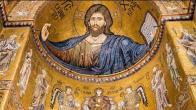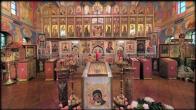You are here
St. Alexis the Man of God, in Rome
17/30 March
In the fourth century, in Rome lived the wealthy spouses, Euthymianus and Aglaia, who were known for their kindheartedness and compassion. Daily they received in their home and fed the poor, orphans, widows and strangers. If on any day few paupers would come to the table, Euthymianus would say with sadness: "I am unworthy to walk on the earth of my God".
Everyone loved Euthymianus and his wife, but they had no children. Euthymianus and Aglaia regretted this and daily begged the Lord that for comfort in old age He would send to them a son. Finally, God heard their prayer, and a son was born to them, whom they called Alexis at Baptism. The parents exerted every effort so that their son would grow up good and pious.
Directed by his pious parents, Alexis loved the Lord from his early years. He fasted strictly, dressed modestly, prayed often. When Alexis attained his majority, his parents found a bride for him and married him. [Translator's note: Literally, "crowned him" - a reference to the placing of crowns on the heads of the bride and groom during the Orthodox wedding service.]
On the first day of the marriage, when the young spouses were left alone, Alexis came up to us virgin-wife, gave her a gold ring and a precious belt and said: "Preserve this, and may God be between thee and me until the time that His grace will arrange something new for us". Having said this, Alexis withdrew.
Having taken off from himself the rich wedding garments, he put on the garments of a village dweller, took a little money and left his parents' home. Alexis was drawn by Christ's words: "And every one that hath forsaken houses, or brethren, or sisters, or father, or mother, or wife, or children, or lands, for my name's sake, shall receive an hundredfold, and shall inherit everlasting life" (Matthew 19:29). One may suppose that before leaving his father's home, Saint Alexis agreed to marry, in order to assure the future for his bride.
Wandering from land to land, Alexis finally reached the city of Edessa. Here he found the ancient Image of the Saviour Not-Made-by-Hands. In Edessa, Alexis distributed his last money to the poor and began to live as a pauper near a church in honor of the Most Holy Theotokos, living on alms. Alexis passed day and night in prayer, while on Sundays he would commune of the Holy Mysteries. Thus, he passed seventeen years in poverty and spiritual struggles.
Gradually, many of the inhabitants of Edessa became acquainted with the pauper who sat by the church, and they valued his high spiritual qualities. One of the ministers of the church saw in a dream the Most Holy Virgin Mary, who said to him: "Bring into my church the man of God: for his prayer reaches unto God, and as a crown upon a king's head, so is the Holy Spirit upon him". The church minister wondered to whom these words applied, but the vision was repeated, and the Mother of God pointed to the pauper who was sitting at the doors of the church.
From that time, esteem for Alexis grew still more, and they began to praise him and openly set him forth as an example. Then Alexis, fleeing vainglory, left Edessa. Having reached the Mediterranean Sea, he boarded a ship, in order to get to some other land. While sailing on the sea, a terrible storm arose, and after several days threw the damaged ship onto the shores of Italy - not far from Rome, where Alexis had lived formerly.
Alighting on the shore, Alexis made for his home, and on the road met his father, who was returning from church. Bowing before him, Alexis said: "Have mercy on me a sinner and give me a corner in thy house. May the Lord bless thee for this and grant thee the Kingdom of Heaven, and if thou hast any of thy near ones wandering, may He return him safely. These words reminded Euthymianus of his lost son; he shed tears and commanded that the pauper be given a small little house on his property.
Thus, Alexis began to live on his father's property, unrecognized by anyone, because, having lived so many years in deprivations, Alexis had greatly changed outwardly. At home, Alexis also led the same manner of life as earlier in Eclessa: he constantly prayed to God, communed each Sunday, endured poverty, being satisfied with the very least. It was difficult for Alexis, living near his father, mother and wife, to see their sorrow over their lost son and husband. Thus, seventeen more years passed.
When Alexis felt the approach of his death, he described his life on a parchment, beginning from the day of his parting from his kin, and began to prepare for death.
On the following Sunday, Innocent, the Bishop of Rome, in the presence of the Emperor Honorius, was serving the Liturgy in church. There were many people praying. During the divine service, a voice rang out in the church: "Seek the man of God in the house of Euthymianus". The Emperor, having turned to Euthymianus, asked: "Why hast thou not informed us that the man of God is living with thee?" Euthyrnianus replied: "God sees that I know not of whom thou speakest".
Then the Emperor Honorius and Pope Innocent decided personally to visit Euthymianus' home and to become acquainted with the man of God. Coming to his property, they learned from the servants that in the small little house lived a pauper who passed all his time in prayers and strict fasting.
Entering into the hut, they saw an emaciated man lying without breath on the floor. His face shone, and his body was fragrant.
The Emperor, having seen the parchment in Alexis' hand, took it and read it aloud. Then, at last, Euthymianus and all those present learned that the pauper, who had lived there for many years, was also the lost son of Euthymianus. The parents sorrowed greatly that they had learned late about their beloved son, but at the same time they were also comforted by the fact that he had attained such great holiness.
The saint's body, from which hearings began to be performed, was placed in the middle of the square. Hither all Rome gathered. The Emperor and the Pope themselves bore the body of the saint into the church, where it was for a whole week, and then was placed in a marble sepulchre. From the holy relics a fragrant myrrh-oil began to flow forth which granted healing to the sick.
Relics in cathedral - monthly calendar
| S | M | T | W | T | F | S |
|---|---|---|---|---|---|---|
|
|
|
|
1
|
2
|
3
|
4
|
|
5
|
6
|
7
|
8
|
9
|
10
|
11
|
|
12
|
13
|
14
|
15
|
16
|
17
|
18
|
|
19
|
20
|
21
|
22
|
23
|
24
|
25
|
|
26
|
27
|
28
|
29
|
30
|
31
|
|
PARISH LIFE
Address of our Cathedral
While all the materials on this site are copyrighted, you may use them freely as long as you treat them
with respect and provide attribution on the Russian Orthodox Cathedral of St.John the Baptist of Washington DC.









